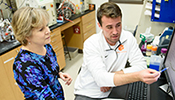Welcome to CHOg2p: Advanced Biomanufacturing- Catalyzing Improved Host Development and High Quality Medicines through Genome to Phenome Predictions
The CHOg2p project will develop new systems biology approaches to aid in the understanding of the genome to phenome relationship and will apply these approaches and knowledge to address key challenges of interest to the academic, government, and industrial biotechnology community. By focusing on a long-studied, but only recently sequenced organism, the Chinese hamster ovary (CHO) cell line, this project will study the fundamental basis for genomic instability in CHO cells to advance a quantitative understanding of the complex interactions between genome and environment that generate variable phenotypic traits. Perhaps as importantly, because CHO cells are the most important host cell used in manufacturing therapeutic proteins (also known as biopharmaceuticals), advances from this project will help to address current challenges in the biotechnology industry.This project leverages complementary expertise in CHO systems biology from three EPSCoR jurisdictions: South Carolina, Delaware, and Louisiana. South Carolina hosts Clemson University’s (Clemson) renown genomics research institute and Clemson’s bioreactor optimization experts focused on CHO cells. The University of Delaware (UD) is a national and international leader in CHO genome knowledge – maintaining and hosting the global CHO genome resource and housing the multidisciplinary Center for Bioinformatics and Computational Biology (CBCB) with infrastructure and expertise in `omics and systems biology analysis. Louisiana’s Tulane University (Tulane) has strengths in novel protein expression and systems biology techniques applied to CHO cells, as well as a Center for Bioinformatics and Genomics, with several focus areas, including identifying multiple signaling and gene regulation pathways. Additionally, faculty from Delaware State University (DSU) are collaborating on the project in the area of bioinformatics.
To learn more about our Undergraduate Summer Research Program, please view the program flyer here. To apply, please fill out an REU 2022 application here.
This material is based upon work supported by the National Science Foundation under Grant No. OIA-1736123. Any opinions, findings, and conclusions or recommendations expressed in this material are those of the author(s) and do not necessarily reflect the views of the National Science Foundation.





